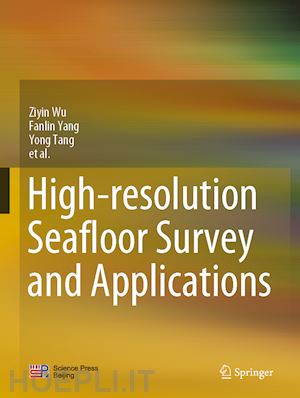
Questo prodotto usufruisce delle SPEDIZIONI GRATIS
selezionando l'opzione Corriere Veloce in fase di ordine.
Pagabile anche con Carta della cultura giovani e del merito, 18App Bonus Cultura e Carta del Docente
In order to facilitate readers to understand how to acquire and apply scientific research based on submarine topographic data, it highlights the combination of theory, technology and scientific application. This book is useful as a reference for professional and technical personnel in related fields and also as a textbook for both graduate and undergraduate students as well.
Introduction.- Multi-beam bathymetry technology.- Airborne LiDAR bathymetry technolog.- Side scan sonar and sub-bottom profiler detection technology.- Navigation and positioning technology.- Water level measurement and vertical datum conversion technology.- DTM and Seafloor mapping technology.- The delimitation of continental shelf based on seafloor graphics.- The application of submarine geomorphology.- The application of automatic recognition of seabed target.- The application of seafloor classification.- The application of research on international seabed resources.
Ziyin Wu, Ph.D., is Professor of Marine Geology and Geophysics. He is Director of the Key Laboratory of Submarine Geosciences (KLSG) at the Second Institute of Oceanography, Ministry of Natural Resources, Hangzhou, China. He has been engaged in high-resolution submarine geomorphology since 1995. His research focuses on the processing theories and applications of multi-beam echo sounder (MBES), and the studies of high-resolution geomorphic features and evolution based on MBES's data. So far, Prof. Wu has made a series of scientific achievements, including 2 monographs as Editor-in-Chief, 10 co-authored books, 107 journal papers, 37 authorized China and US patents, and 14 science and technology awards. He has also supervised 4 postdoctoral fellows, 6 Ph.D. students and more than 10 master students.
Fanlin Yang, Ph.D., is Professor of Marine Geodesy. He is Dean of the College of Geodesy and Geomatics, Shandong University of Science and Technology, Qingdao, China. His research focuses on the marine geodesy and navigation. More specifically, his research topics include data processing and applications of multi-beam echo sounder system and airborne LiDAR bathymetry system, and technologies of marine navigation and positioning. So far, Prof. Yang is (Co-)author of 50 papers in refereed scientific journals (Web of Science), (Co-)inventor of 22 China and US patents, (Co-)winner of 7 science and technology awards in China, and 3 standards as Editor-in-Chief. He has also supervised 2 postdoctoral fellows, 55 Ph.D. and master students.
Yong Tang, Ph.D., is Professor of Marine Geology and Geophysics. He works in the Key Laboratory of Submarine Geosciences (KLSG) at the Second Institute of Oceanography, Ministry of Natural Resources, Hangzhou, China. He is also a member of the Commission on the Limits of the Continental Shelf, United Nations. Professor Tang has been involved in the work on the delimitation of continental shelf over the past 15 years. As Chief Scientist and Project Leader in China-Nigeria, China-Mozambique, China-Seychelles joint cruise and research project, he has contributed himself to the international cooperation on marine geophysics and delimitation of continental shelf. He is also Project Leader in the National Key R&D Program, National Natural Science Foundation and National High Technology R&D Program of China. So far, Prof. Tang has published more than 30 scientific papers, 3 monographs and 3 patents. He also has supervised 2 Ph.D. students, 8 master students, 4 bachelor students and 2 international scholars.











Il sito utilizza cookie ed altri strumenti di tracciamento che raccolgono informazioni dal dispositivo dell’utente. Oltre ai cookie tecnici ed analitici aggregati, strettamente necessari per il funzionamento di questo sito web, previo consenso dell’utente possono essere installati cookie di profilazione e marketing e cookie dei social media. Cliccando su “Accetto tutti i cookie” saranno attivate tutte le categorie di cookie. Per accettare solo deterninate categorie di cookie, cliccare invece su “Impostazioni cookie”. Chiudendo il banner o continuando a navigare saranno installati solo cookie tecnici. Per maggiori dettagli, consultare la Cookie Policy.